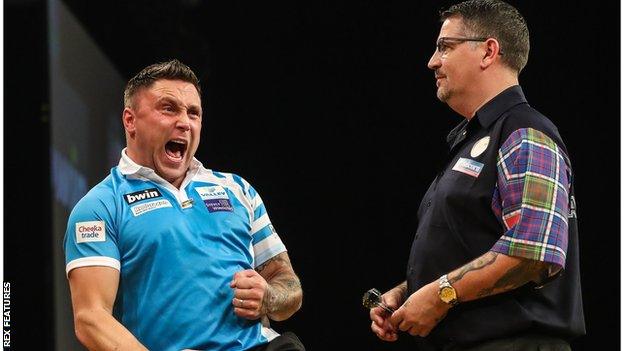Grand Slam of Darts: Crackdown planned on darts 'gamesmanship'
- Published

Gary Anderson took exception to what he viewed as slow play and over-exuberant celebrations by Gerwyn Price and the two clashed verbally on several occasions during the final on Sunday
Players could face punishments during darts matches in an effort to deter gamesmanship, the BBC has learned.
Gerwyn Price and Gary Anderson have been referred to the Darts Regulation Authority after Sunday's ill-tempered Grand Slam of Darts final.
The two men squared up in the 15th and 28th legs as Welshman Price beat the Scot 16-13 in Wolverhampton.
Players who breach the rules on gamesmanship are currently penalised - usually with a fine - after the event.
But under plans being considered by the Professional Darts Corporation (PDC), a sliding scale of penalties could be available during the match - in a similar way to tennis.
A player could be warned for behaviour such as over-celebrating. A second breach could mean a leg being forfeited, and so on.
Anderson reached the final by beating Michael van Gerwen, but with the fall-out continuing from Thursday's 'Fartgate' controversy, in which the Scot had been forced to deny accusations of breaking wind during his 10-2 second-round win over Dutchman Wesley Harms.
In the best-of-31 final, two-time world champion Anderson led Price 11-8, but then lost eight of the last 10 legs.
The 47-year-old took exception to what he viewed as slow play and over-exuberant celebrations by Price and the two clashed verbally on several occasions.
After the match finished without the customary handshake, Price lifted the winner's Eric Bristow Trophy amid loud boos from the crowd at the Aldersley Leisure Village.
"The whole match has been referred to the Darts Regulation Authority for their consideration," said Barry Hearn, chairman of the PDC, which organised the tournament.
It is understood video footage of the match will be studied, with Price's celebrations and Anderson's movements around the oche set to face scrutiny.
"The PDC is not against players celebrating, but clearly any celebration verging on gamesmanship would be something we frown upon," added Hearn.
"Another rule says players must not infringe on the 'exclusion zone' at the oche until it is their turn to throw."